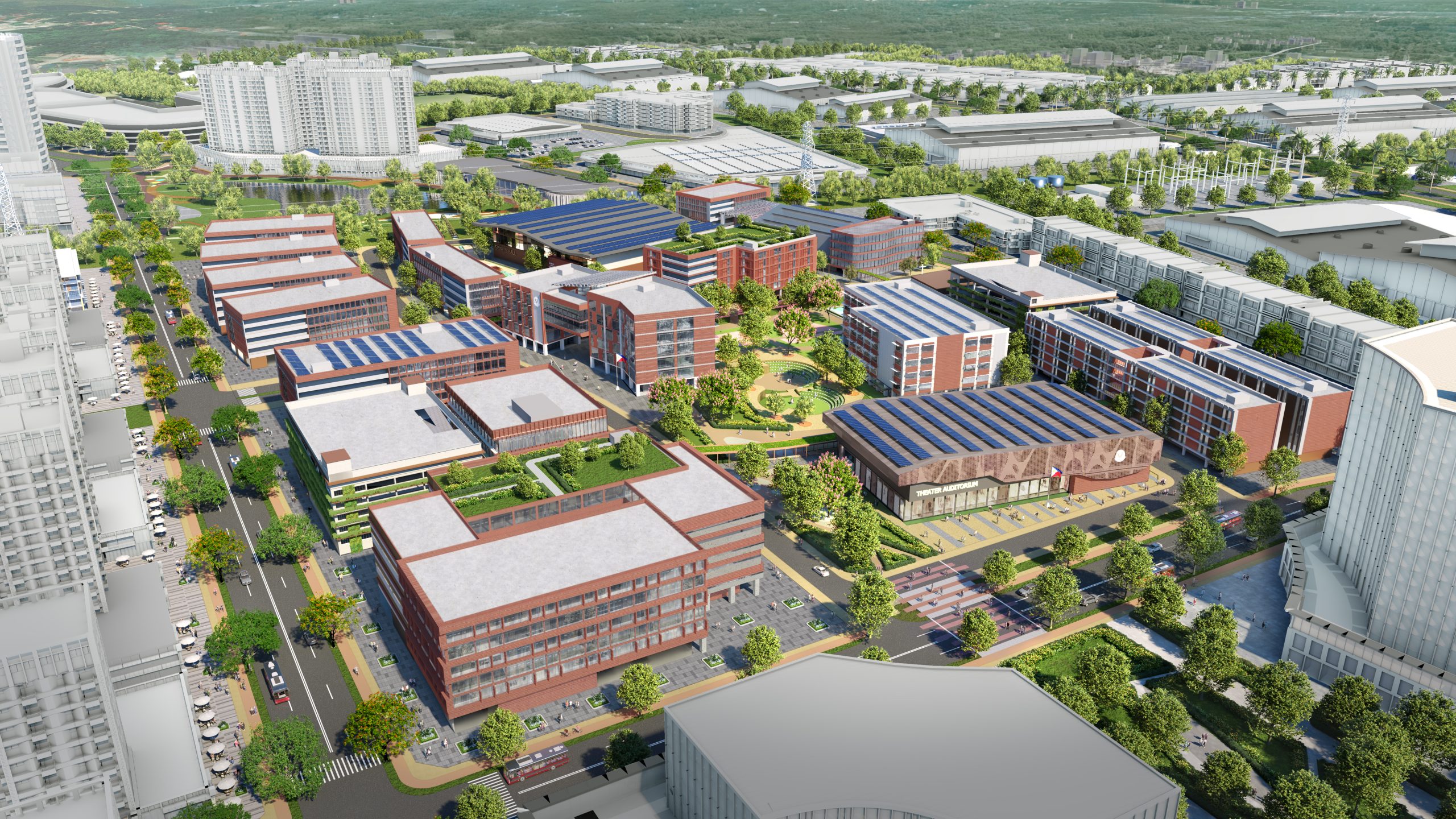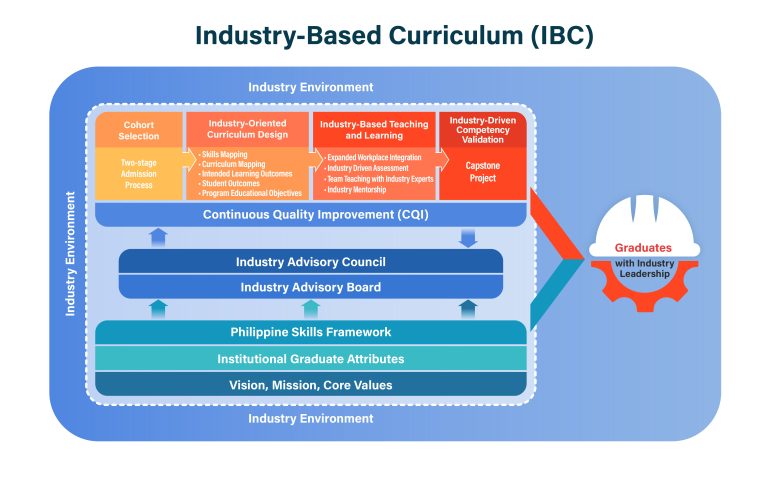 |
| (Image Source: Batangas State University — The National Engineering University) |
Batangas State University, The National Engineering University (BatStateU The NEU), officially launched its BatStateU LIMA Campus last November 11, 2025, marking a transformative milestone in Philippine engineering and technology education through its Industry-Based Curriculum (IBC) framework. In partnership with Aboitiz Economic Estates, BatStateU LIMA Campus — strategically located at the heart of LIMA Estate, one of the country’s most advanced industrial and economic zones — embodies the University’s vision to seamlessly integrate academic rigor with real-world industry applications. “At BatStateU LIMA Campus, Industry-Based Learning (IBL) is not merely a pedagogical innovation — it is a transformative educational philosophy. From admission to graduation, our students learn with the industry, in the industry, and for the industry, ensuring that they graduate not only ready for work but ready to lead and innovate the industry,” said University President Dr. Tirso A. Ronquillo.
A New Era Of Industry-Based Learning (IBL)
The Industry-Based Curriculum (IBC) framework is designed to bridge the long-standing gap between academic instruction and industrial practice. By embedding the campus within a fully operational industrial ecosystem, BatStateU LIMA enables students to learn in proximity to the very enterprises that define the nation’s economic landscape. Each program under the IBC is co-designed with industry experts to ensure alignment with current and emerging workforce needs. The framework also integrates mentorship, co-delivered courses, and hands-on project-based learning, allowing students to engage directly with real-world challenges and technologies. A defining feature of this innovative approach is the Extended Professional Placement (EPP) — a structured, two-semester immersion that transcends the limits of traditional internships. Through the EPP, students undertake long-term professional engagements within partner companies, gaining substantial exposure to actual industry operations, project implementation, and standard engineering practices while receiving concurrent academic supervision and mentorship. This immersive model equips students with the confidence, adaptability, and practical expertise that are demanded by today’s dynamic industries.
Industry As Co-Facilitator Of Learning
Setting its Industry-Based Learning (IBL) model apart from conventional academic delivery, BatStateU LIMA Campus positions industry as an active co-facilitator throughout every stage of the learning journey. From admission to graduation, industry partners play an integral role in shaping the student learning experience. Representatives from partner companies participate in the admission and selection process, helping identify learners whose potential and mindset align with sectoral needs. The curriculum itself is developed in close collaboration with industry experts, ensuring that course content, laboratory work, and applied projects remain responsive to evolving professional standards. Selected courses are co-delivered by practitioners, allowing students to gain firsthand knowledge of industry practices. As students progress through the program, they engage in capstone projects and other assessment tasks that address real-world problems, co-supervised by faculty mentors and industry professionals. These projects result in research-based, practical solutions that find direct application within the partner companies. Furthermore, industry partners contribute to the assessment of student skills and program outcomes, reinforcing the University’s commitment to continuous improvement and contributing to the industry-readiness of the graduates.
The Industry Partnership Center: A Nexus Of Collaboration
At the core of this initiative is the Industry Partnership Center (IPC) — the University’s central hub for strategic collaboration with the industry. The IPC facilitates engagements in curriculum co-design, faculty immersion, professional placement, and collaborative research. It also facilitates joint workforce upskilling programs, innovation initiatives, and capability-building activities that advance both academic and industry objectives. To strengthen this ecosystem, the IPC convenes two key advisory bodies: the Industry Advisory Board (IAB) and the Industry Advisory Council (IAC). The IAB, composed of senior executives and sector leaders, provides strategic guidance on curriculum design, institutional direction, and industry engagement priorities. Meanwhile, the IAC, composed of technical and operational experts, ensures that course content, laboratory resources, and student outputs remain current and relevant to real-world needs. These advisory structures reinforce BatStateU’s agility and responsiveness to emerging technologies, industry demands, and global best practices.
 |
| The framework diagram of Batangas State University's Industry-Based Learning curriculum (Image Source: Batangas State University — The National Engineering University) |
A Call To Co-Create The Future Of Work And Learning
BatStateU The NEU invites progressive companies, innovation-driven enterprises, and public sector organizations to join in co-creating the future of engineering and technology education. Through these partnerships, organizations gain access to a highly motivated and technically proficient talent pipeline, engage in collaborative research and innovation initiatives, and contribute to the continuous improvement of academic programs. Partners also benefit from opportunities for workforce upskilling, institutional co-branding, and national visibility through their involvement in BatStateU’s forward-looking education ecosystem.
CALABARZON Powers PH Industrial Growth Through BatStateU LIMA Campus' Industry-Based Learning
As the Philippines’ premier industrial corridor, CALABARZON continues to anchor national economic growth through its vibrant network of manufacturing, technology, and production enterprises. Encompassing the provinces of Cavite, Laguna, Batangas, Rizal, and Quezon, the region hosts the country’s highest concentration of industrial parks and technoparks, serving as home to global and local leaders in automotive, semiconductor, electronics, and food manufacturing. This industrial landscape has transformed CALABARZON into the nation’s most dynamic engine of employment and innovation. The region consistently leads the country in generating jobs across mechanical, technical, and industrial occupations — clear evidence of its economic strength and its continuing demand for a workforce equipped with advanced, industry-relevant skills. Yet, this progress also brings an urgent challenge: aligning education with the complexity of modern industry. Employers now seek graduates who are not only academically trained but operationally competent — capable of working in high-precision, technology-driven environments. To sustain CALABARZON’s growth trajectory, education must evolve from classroom-based instruction to immersive, industry-embedded learning that develops real-world competencies alongside academic excellence. This is the mission that Batangas State University, The National Engineering University (BatStateU The NEU), fulfills through its LIMA Campus, designed as a hub for applied learning and innovation, which serves as the University’s flagship response to the workforce development needs of CALABARZON and the nation. Dr. Ronquillo declared, “The CALABARZON region represents the heart of Philippine industrialization. By embedding our university right within this dynamic ecosystem, BatStateU ensures that education and industry move forward together — mutually reinforcing each other to strengthen national competitiveness.”
Beyond degree programs, BatStateU LIMA Campus also advances lifelong learning and professional development within CALABARZON’s industrial sector. Through the Expanded Tertiary Education Equivalency and Accreditation Program (ETEEAP), mid-level professionals can earn formal college degrees by validating prior learning and experience, while the University’s Industry Microcredential programs allow employees to upskill or reskill in areas such as data science, cybersecurity, Internet of Things (IoT), and advanced manufacturing. The campus itself reflects the University’s forward-looking vision. Featuring smart classrooms, advanced laboratories, and digital-ready systems for hybrid learning, the BatStateU LIMA Campus is built to support an integrated educational experience where students and professionals can study, collaborate, and innovate alongside the industries shaping CALABARZON’s economy. Situated at LIMA Estate's Biz Hub within the boundaries of Lipa City and the municipality of Malvar in the province of Batangas, the BatStateU LIMA Campus marks a significant milestone in the University’s commitment to innovation and industry collaboration. This was made possible after the Board of Aboitiz Economic Estates approved the donation of ten hectares of land within the Aboitiz LIMA Estate to Batangas State University last June 13, 2025, further solidified by the formal signing of a Memorandum of Agreement (MOA) between BatStateU The NEU and Aboitiz Economic Estates last August 12, 2025 which led to the establishment of the campus. As the region continues to lead in national output and employment, BatStateU The NEU stands at the forefront of ensuring that its human capital keeps pace with technological and industrial progress. By cultivating globally competitive, industry-embedded professionals, the University contributes not only to regional prosperity but also to the realization of a sustainable, innovation-driven Philippine economy. To know more about BatStateU ‘s Industry-Based Learning Curriculum, watch here.